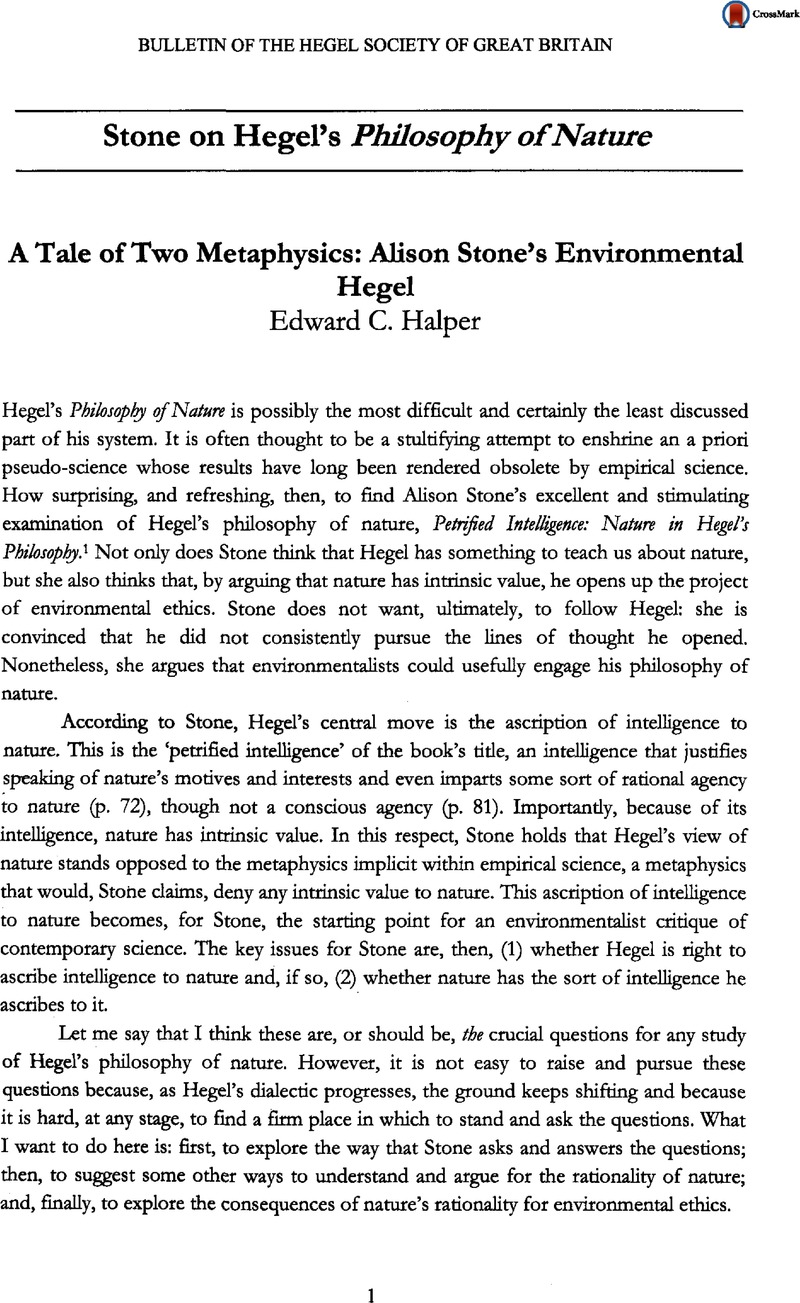No CrossRef data available.
Article contents
A Tale of Two Metaphysics: Alison Stone's Environmental Hegel
Published online by Cambridge University Press: 23 June 2015
Abstract

- Type
- Stone on Hegel's Philosophy of Nature
- Information
- Bulletin of the Hegel Society of Great Britain , Volume 26 , Issue 1-2: number 51/52 , 2005 , pp. 1 - 12
- Copyright
- Copyright © The Hegel Society of Great Britain 2005
References
Notes
1 Stone, Alison, Petrified Intelligence: Nature in Hegel's Philosophy (Albany, N.Y.: State University of New York Press, 2005)CrossRefGoogle Scholar. In this paper I use ‘philosophy of nature’ to refer to the subject, ‘Philosophy of Nature’ to refer to the second part of Hegel's system, and ‘Philosophy of Nature’ to refer to Hegel's published treatment of this part of his system, Hegel's Philosophy of Nature, trans. Miller, A. V. (Oxford: Clarendon Press, 1970)Google Scholar. (Page references are to this edition.) This latter is the second part of Hegel's manual for his students, the Encyclopaedia, together with a compendium of student notes on his lectures, Zusätzen. A handy German edition is: Enzyklopaedie der philosophischen Wissenschaften im Grundrisse (1830). Zweiten Teil. Die Naturphilosophie mit mundlichen Zusätzen. vol. 9 of Hegels Werhe (Frankfurt: Suhrkamp, 1970)Google Scholar. The corresponding three-fold distinction holds for my references here to logic and philosophy of mind. Further, I capitalise a term when it refers to one of Hegel's categories but leave it in lower case when it refers generally to the character signified by the category.
2 Büttner, Stefan, ‘Hegel on Galilei's Law of Fall’, in Hegel and Newtonianism (Dordrecht: Kluwer, 1993), p. 333 Google Scholar; Michael John Petty also distinguishes between the a priori construction of the categories and their empirical identification. He explains that when the former acquire empirical significance, they become the ‘natural forms’ of the ‘logico-natural a priori structures’, and he distinguishes the natural form from the ‘purely physical concept’.
3 See §304Z, Hegel's Philosophy of Nature, p. 152. By the ‘metaphysics of the understanding’, he means the faculty that insists on the existence of substrates. Similarly, Hegel speaks of a ‘metaphysics that the concept does not recognise’ (§312Z, p. 166), meaning one that rigidifies determinations. (Another place where the metaphysics of the understanding is mentioned is §320Z, pp. 201, 211.) Also, the ‘metaphysics prevalent both in chemistry and physics’ is the metaphysics of immutable elements (§333A, p. 265). See also Enz. §98Z, Hegel's Logic, trans. Wallace, William (Oxford: Clarendon Press, 1975), p. 144 Google Scholar.
4 Hegel expounds the distinction in his early ‘Verhältniss des Skepticismus zur Philosophie, Darstellung seiner verschiedenen Modificationen, und Vergleichung des Neuesten mit dem Alten’, Gesammelte Werke, im Auftrag der Deutschen Forschungsgemeinschaft, vol. 4, edited by Buchner, H. and Pöggeler, O. (Hamburg, 1968), pp. 207–208 Google Scholar. For a brief discussion see my ‘Positive and Negative Dialectics: Hegel's Wissenschaft der Logik and Plato's Parmenidei ’, in Platonismus im Idealismus: Die platonische Tradition in der klassischen deutschen Philosophie, edited by Mojsisch, Burkhard and Summereil, Orrin F. (Munich: Saur Verlag, 2003), pp. 215–16CrossRefGoogle Scholar.
5 The Owl of Minerva, XXXIV (2002)Google Scholar is devoted to the philosophy of nature. My paper, ‘The Idealism of Hegel's System’ (pp. 19–58) argues that Hegel is a thoroughgoing idealist. John Burbidge's paper emphasises Hegel's empirical support. William Maker argues for a version of dualism, and Will Dudley endorses his view. Dualism is implicit in McTaggart's famous question, ‘what is the subject-matter to which the whole dialectic applies?’ McTaggart, John M. E., A Commentary on Hegel's Logic (Bristol: Thoemmes, 1990), p. 6 Google Scholar.
6 See Harris, Errol E., The Spirit of Hegel (Atlantic Highlands, N.J.: Humanities Press, 1993), p. 120 Google Scholar: ‘In this discipline the pronouncements of natural science are not superseded or contradicted, but they are seen in a new light, as a preliminary, less self-conscious, awareness of an object that has now come to be recognised as identical with the knowing subject in the Idea’ (cf. pp. 133, 141, Enz. §246). He goes on to say that although he once identified empirical science with the understanding (as he thinks Findlay, J. N. does in The Philosophy of Hegel: An Introduction and Re-Examination [New York: Collier Books, 1966], p. 92 Google Scholar), he now rejects this identification because (1) Hegel says in the Encyclopaedia that the understanding is a moment in all knowledge (§§79–80) and (2) the Phenomenology's treatment of natural science in Beobachtung der Natur invokes the activity of reason that corresponds to the Concept. Harris is right to reject a narrow identification of empirical science with the understanding. Reason is the faculty of argument, and a science with no argument is not inconceivable. What is at issue here is not such an identification but the status of the concepts at work in science. If they are static, we grasp them through the understanding; if they transform themselves into each other, reason is at work. Harris distinguishes two modes of reason: ‘In the Philosophy of Nature the activity of reason is full blown, while in natural science it is only ‘instinctive’ and largely intuitive’ (p. 133). However, he also thinks that the philosophy of nature works with the discoveries of empirical science (p. 141).




